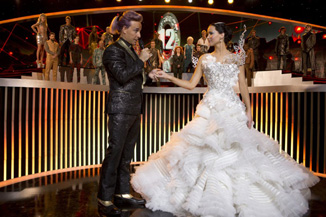Book vs. Movie: Catching Fire
By Ben Gruchow
November 4, 2015
What’s lost in this incarnation of the sequence is the sense, abundant in the early stretch of the novel, of the chess game; everyone’s aware that there are moves and counter-moves being made, and that the situation is on the verge of spinning out of control, but the more important move is keeping up an immediate appearance of normalcy and calm. There is a chilling moment in the book immediately following this eulogy where we hear the isolated pop of gunshots ill-muffled through a set of doors, and Katniss internally - almost detachedly - wonders who is on the receiving end of them. This is a far louder and more hectic chain of events in the film, which is more visceral and pointed (and arguably more emotionally sound) than the book, but it’s also comparatively shallow.
That last sentence does a fair job of encapsulating the big difference between the book and movie for this installment of the trilogy. That’s enough to make it superior to the first film - for that one was also comparatively shallow, and it was necessarily more cautious in what it was depicting - but it’s still at a disadvantage to its source material. I confess to a bias in favor of the chess-game pacing of the book, but it’s also more rewarding to see the layers of intrigue and escalation slowly build up around everyone. The director fills in the corners where he can; the nature of the Avox (the term for a political rebel or infidel of the Capitol who’s had their tongue removed, and been forced into silent servitude) wasn’t acknowledged in the first film, and it isn’t mentioned here either - but it’s shown, in what is really a fantastically creepy achievement of static composition and focus, during an unrelated dialogue scene.
The other side of this issue has to do with the larger storyline of Panem’s revolution, and it’s here that - for all of its strengths as a thriller - the film falters the most against the source material. There are hints and suggestions about where the characters and plot are headed in The Hunger Games: Catching Fire, and they’re articulated as well as they can be by a good filmmaking team and a fantastic cast, but the final revelations do deserve more weight. The final minutes of the movie and book dump a lot of significant exposition and orientation into a very compressed timeframe, and the film compresses it much further, into roughly two lines of dialogue - three, if we’re being charitable. It’s functional, but unforgiving toward pacing and rhythm in the context of a film that’s so far been precise and steady with both. This is a good piece of work, closer to the essence of the material than the first film, but it doesn’t quite improve on the source novel enough to counteract its more significant assets.
Book vs. movie winner: Book.
Continued:
1
2
3
4
5
|
|
|
|




